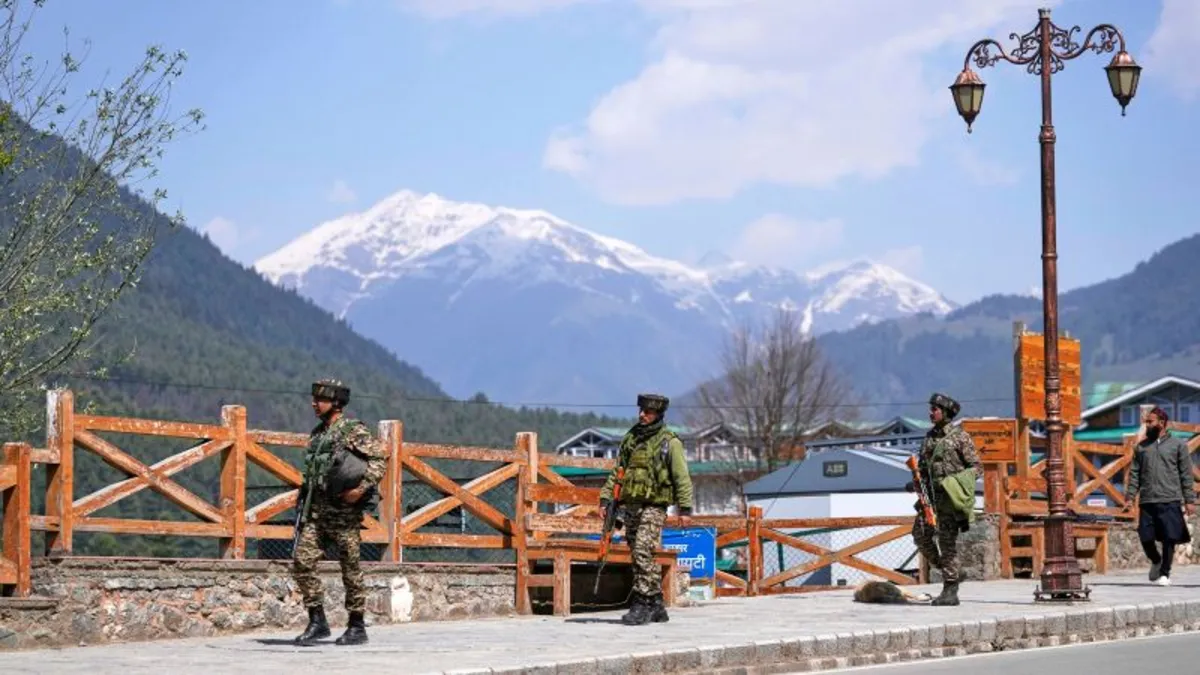
The relations between India and Pakistan are rapidly deteriorating following a tragic attack in the disputed Himalayan region of Jammu and Kashmir, which resulted in the deaths of over two dozen tourists. This incident has raised significant concerns about a potential military escalation between these two nuclear-armed nations. In response to what has been characterized as the worst assault on civilians in years, New Delhi has taken several punitive measures against Islamabad, including downgrading diplomatic ties, summoning its top diplomat, suspending its involvement in a crucial water-sharing treaty for the first time, and closing a key border crossing.
On Tuesday, gunmen opened fire on tourists in the popular travel destination of Pahalgam, located in Indian-administered Kashmir. This rare attack on tourists led to the deaths of 25 Indian citizens and one Nepali national in the scenic Baisaran Valley, an area accessible only by foot or horseback. Eyewitnesses described horrifying scenes as the assailants approached and fired at close range, with some survivors stating that families were targeted and accused of supporting Prime Minister Modi before being shot. The aftermath of the attack, depicted in photos and videos shared widely on social media, showcased the grief and terror experienced by the victims' loved ones.
The little-known militant group The Resistance Front claimed responsibility for the attack, expressing dissatisfaction with "outsiders" who have settled in the region, although they did not provide any evidence to support their claims. Indian authorities have since intensified police and military deployments in the area as they search for the attackers. In a subsequent speech, Prime Minister Modi vowed to pursue the assailants "to the ends of the earth," emphasizing that India would identify and punish every terrorist involved.
The Resistance Front (TRF), also referred to as Kashmir Resistance, is a relatively new militant organization that has claimed responsibility for various attacks on civilians in Kashmir in recent years. Emerging in 2019 via the encrypted messaging app Telegram, TRF is believed to have connections to the banned Islamist group Lashkar-e-Tayyiba, which was responsible for the devastating 2008 Mumbai attacks. The group positions itself as an indigenous resistance force against what it describes as illegal occupation, without a centralized leadership structure.
On Thursday, Kashmir police published notices naming three suspects allegedly linked to the attack, two of whom are believed to be Pakistani nationals. However, details regarding how these individuals were identified remain unclear.
The region of Kashmir has long been a flashpoint between India and Pakistan, with both countries claiming the territory in its entirety. This dispute has led to three wars and ongoing tensions over more than 70 years. The Line of Control (LoC) acts as a de facto border, dividing the region between New Delhi and Islamabad. The situation has intensified since the Modi-led government's revocation of Kashmir's constitutional autonomy in 2019, bringing it under direct control from India. Despite claims of decreased militancy, violence persists, raising concerns about security in what is considered one of the most militarized zones globally.
While India has not explicitly blamed any group for the recent attack, it has justified its retaliatory measures as a response to Pakistan's alleged support for cross-border terrorism. Pakistan, on the other hand, has denied involvement and plans to hold a national security meeting to discuss the situation. New Delhi's punitive measures include shutting down a key border crossing and expelling military advisors from the Pakistani High Commission in India.
One of the most significant actions taken by India is the suspension of its role in the Indus Water Treaty, a vital water-sharing agreement between India and Pakistan that has been operational since 1960. The treaty governs the distribution of water from the Indus River system, a crucial resource for both nations. Experts warn that downgrading diplomatic ties and suspending the treaty could lead to increased instability in the region.
In the wake of the attack, thousands have taken to the streets in Kashmir to condemn the violence, with local businesses reporting a staggering 80-90% cancellation rate in tourism bookings. Schools and businesses have reopened following temporary closures, while demonstrations of solidarity have emerged in places like Srinagar's Lal Chowk. Local residents expressed their grief and support for the victims, stating a united front against the violence.
Meanwhile, anti-Pakistan protests have erupted in India's capital and other cities, further exacerbating fears of rising anti-Kashmiri and anti-Muslim sentiments.
The focus now shifts to how both New Delhi and Islamabad will respond to this crisis. Analysts predict that military retaliation from India is likely, with many questioning the scale and nature of such a response. The 2019 Balakot crisis, wherein India conducted airstrikes in Pakistan following a terrorist attack, serves as a reference point for potential future military actions.
As India’s military capabilities have evolved since then, there is speculation about whether the government will target terrorist leadership or even military installations in Pakistan. However, any military action by India is expected to elicit a response from Pakistan, raising the risk of uncontrolled escalation unless strategic restraint or third-party intervention occurs.